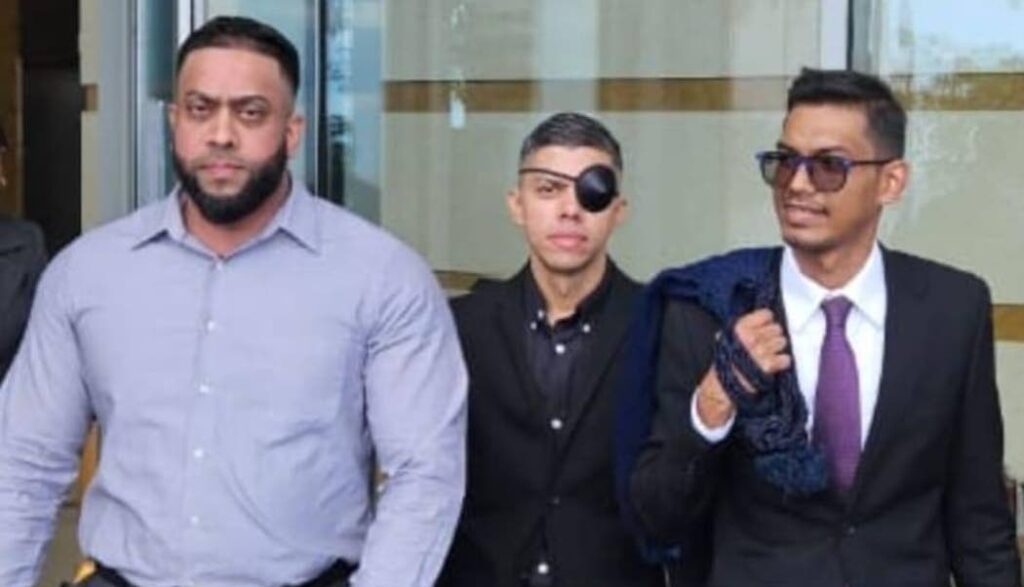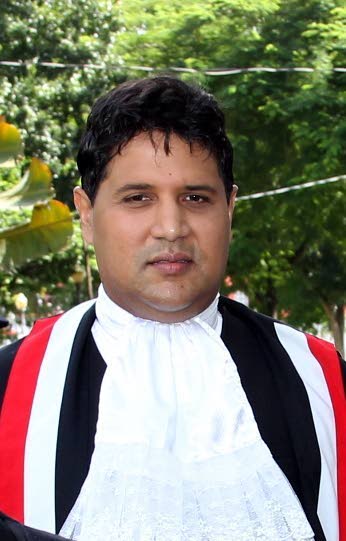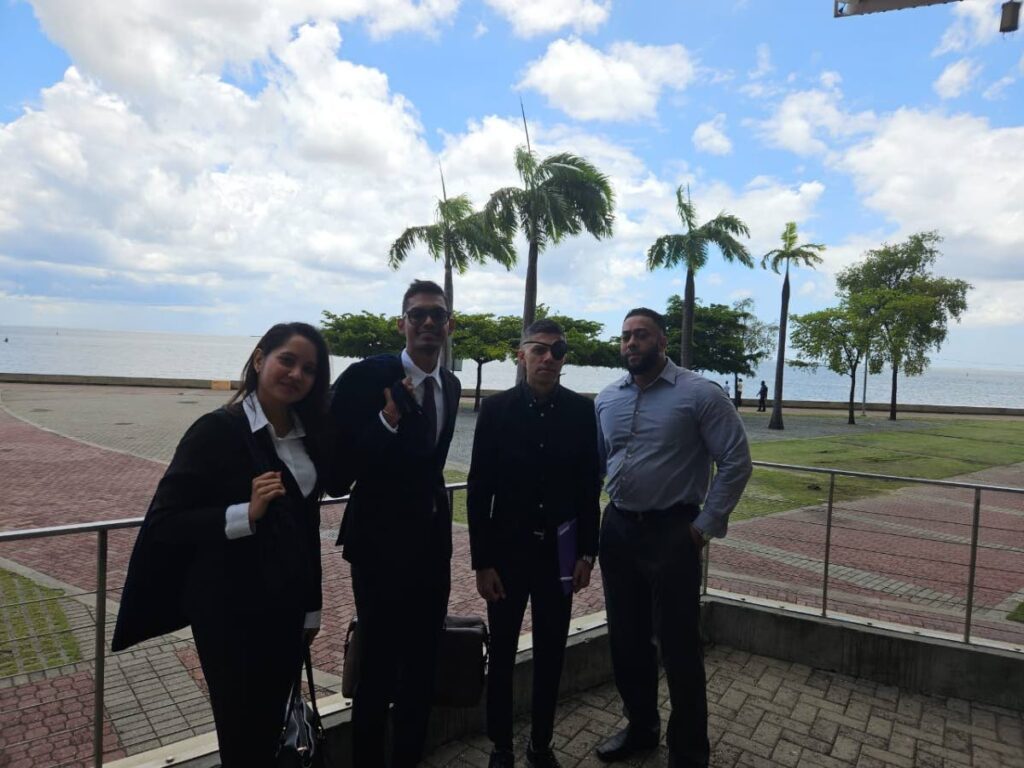Judge: Recording police not a criminal offence

TWO men who were charged with obstructing police officers during the arrest of businessman Inshan Ishmael in 2017 will be compensated for being wrongfully arrested and detained for ten hours by the police.
In an oral ruling after a brief trial on September 3, Justice Frank Seepersad upheld the claims of Anzar Mohammed and Eisa Ghany, the owners of companies based at Barakah Grounds, at the Narsaloo Ramaya Marg Road, Chaguanas, who were on the compound when Ishmael was arrested on October 12, 2017. Each man will receive $90,000, plus interest and costs.
They were arrested for obstructing the police, but their lawsuit contends that all they were doing was “merely recording the arrest from a distance.”
They said they were unlawfully detained for ten hours, causing them financial losses, distress and inconvenience.
After they were arrested and charged, the two received station bail. Then-deputy Director of Public Prosecutions George Busby eventually discontinued the case against them in the magistrates’ court.
The two testified at Tuesday’s trial. Attorneys Richard Jaggasar and Lutchmi Sookram represented them.
Also testifying were Snr Supt Richard Smith and Cpl Dharam Girwar for the State.
In his ruling, Seepersad said the evidence in the case raised a sense of disquiet with the court, as two “upstanding, law-abiding citizens” were arrested and detained for ten hours in circumstances devoid of merit or justification.

In his evidence, Smith said the men were inches away from him after Ishmael was arrested and this made him feel “unsafe.” He also said he had no malicious intent when he arrested them, but had formed the opinion they were obstructing him in the execution of his duty. He also said he had to continually speak to them about their proximity to him and the police vehicle with Ishmael. Smith also denied claims by the men that he used obscene language.
Seepersad said he had an issue reconciling the senior officer’s statements, since, according to the evidence, there were numerous police officers around and Smith was dressed in his khaki uniform, which would have signalled to bystanders he was a senior police officer, and “afforded him respect.”
The judge said Smith’s version would have contained elements of an assault as defined in law, but neither man was charged with that offence. He also said Smith’s version was “unlikely and improbable” and none of the other officers on the scene were called as witnesses to corroborate what took place.
Seepersad said his disquiet was compounded by the fact that the men’s rights were interfered with by the laying of a charge that should not have been proffered. He said the rights of freedom of movement and security of one’s person were fundamental and were jealously guarded by the court.
Seepersad acknowledged that the police had a difficult task to discharge but they must do so within reason and in a measured manner. He said these powers must be cautiously exercised and must be fair, especially if the public is to respect the police.
“The level of co-operation the police need to tackle criminal activity will not be forthcoming where there is overstep and overreach of authority.”
This, he said, would undermine the police’s efforts in trying to partner with the public against criminal elements.
Seepersad also renewed a call for errant police officers to pay court-awarded compensation, rather than the State.
“Until people are affected by their pockets, behavioural patterns would not be revisited and adjusted.”
The judge also reminded that videotaping events in a public place, particularly involving the police, was not a criminal offence.
As he referred to the chorus of calls for police to wear body cameras, Seepersad said these would protect the police. He also said officers could not feel threatened by people recording them, since almost everyone had a cell phone and almost every action could be captured, and this should serve as a check and balance on how the police exercise their power.
Smith, in his affidavit, said while he was not the officer in charge of investigations involving Ishmael, he suggested she get statements from the businessman. He said on October 12, 2017, he was the senior officer at the Divali Nagar site next to Barakah grounds, and officers were instructed to detain Ishmael if he was there.
He said after not hearing from them, he and other officers went to Barakah grounds, when he saw Ishmael and arrested him. He claimed Ishmael began shouting and calling on people to record what was happening.
Smith also said he had to use “necessary force” to get Ishmael into the police vehicle even as he called on onlookers to “tape” the police’s actions. Two of the onlookers who began recording were Mohammed and Ghany.
Smith said he was uncomfortable with the two men’s proximity and unable to properly concentrate on the arrest.
He claimed the men shouted, “All yuh too wicked! Leave the man!” during Ishmael’s arrest.
The men denied this in their testimony.
In a separate ruling in May 2022, Seepersad ruled in Ishmael’s favour in his wrongful arrest and malicious prosecution lawsuit stemming from the October 2017 arrest.
He held that the police acted maliciously when officers laid three charges against Ishmael without reasonable or probable cause.

One of the charges was laid after the limitation period for doing so had expired, Seepersad had pointed out. He awarded compensation, which was to be quantified.
In October 2017, Ishmael was charged with possession of a firearm and ammunition to endanger life, as well as common assault. Those offences were alleged to have taken place on April 2 of that year at the ASJA compound, Caroni Savannah Road, Charlieville.
In July 2020, a Chaguanas magistrate dismissed all the charges against him after upholding a no-case submission by Ishmael’s attorneys.
Seepersad said from the evidence before the court, the police had no basis to arrest Ishmael and detain him on October 12, as they had done.
“It is unacceptable that the State proceeded to act in that manner and proffered the three charges against the claimant.
“The absence of reasonable and probable cause and the very engagement of the claimant, the way he was handled, the proffering of the charge of common assault outside of the limitation period are all circumstances from which this court can and does infer that this prosecution was actuated by improper motive,” said the judge.
The State was represented by Kadine Matthew and Candice Alexander.

Comments
"Judge: Recording police not a criminal offence"